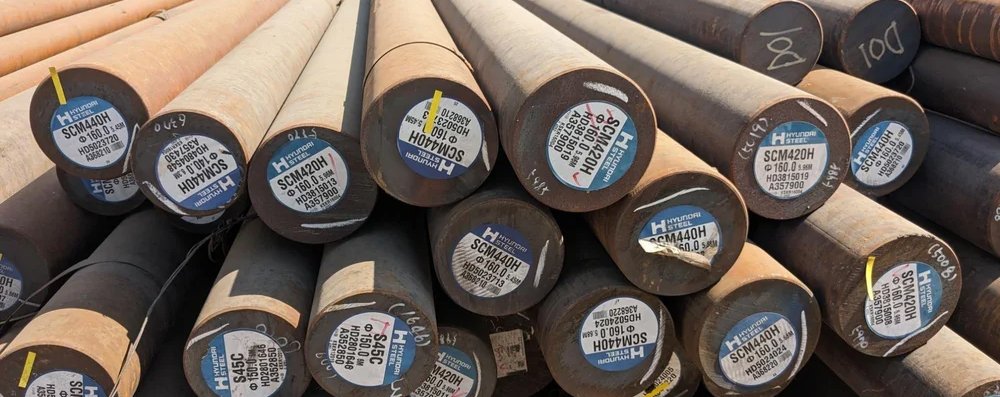Introduction
DB6 is a premium chromium-molybdenum-vanadium hot work tool steel, equivalent to AISI H13 but modified for better toughness, machinability, and heat checking resistance. Designed to withstand high thermal and mechanical stresses, DB6 offers excellent strength, thermal conductivity, and hardenability. It is particularly suited for large die-casting and forging dies, operating under high-pressure and high-temperature conditions.
With superior polishability, toughness, and thermal fatigue resistance, DB6 has become a popular choice in demanding tool-making industries.
Uses/Applications:
DB6 is widely used in the following applications:
- Large die casting dies for aluminum and magnesium alloys
- Plastic molding tools requiring high polishability
- Hot forging and hot extrusion tools
- Pressure die casting dies and inserts
- Forging dies, die blocks, die holders
- Core pins and mandrels
- Hot shear blades
- Hot stamping tools
- Structural parts exposed to thermal fatigue
Properties of the Grade:
- Excellent Toughness
- High Resistance to Heat Checking and Thermal Fatigue
- Good Machinability
- Superior Hardness Retention at Elevated Temperatures
- Good Wear Resistance
- High Compressive Strength
- Good Dimensional Stability
- Excellent Polish ability and Surface Finish
Its thermal shock resistance makes it highly suitable for components exposed to rapid heating and cooling cycles.
Chemical Composition:
| Element | Content (%) |
| Carbon (C) | 0.32 – 0.40 |
| Chromium (Cr) | 4.75 – 5.50 |
| Molybdenum (Mo) | 1.10 – 1.75 |
| Vanadium (V) | 0.30 – 0.80 |
| Silicon (Si) | 0.80 – 1.20 |
| Manganese (Mn) | 0.20 – 0.50 |
| Phosphorus (P) | ≤ 0.03 |
| Sulfur (S) | ≤ 0.03 |
Mechanical Properties:
| Property | Typical Value |
| Hardness (Annealed) | ≤ 230 HB |
| Hardness (After Hardening) | 48–52 HRC (can be higher) |
| Tensile Strength (hardened) | ~ 1350 – 1450 MPa |
| Yield Strength (hardened) | ~ 1100 MPa |
| Impact Toughness (Charpy V-notch) | High (superior to standard H13) |
| Compressive Strength | Excellent at elevated temperatures |
This combination of chromium, molybdenum, and vanadium ensures excellent hardness, toughness, and resistance to high-temperature wear.
Physical Properties:
| Property | Typical Value |
| Density | ~7.80 g/cm³ |
| Modulus of Elasticity (E) | ~215 GPa |
| Thermal Conductivity | ~24.6 W/m·K at 200°C |
| Specific Heat Capacity | ~460 J/kg·K |
| Coefficient of Thermal Expansion | 11.4 × 10⁻⁶ /°C (20–100°C) |
Forging:
Forging Temperature Range: 1050°C – 1150°C
- Preheat slowly to 850°C – 900°C.
- Continue heating to forging temperature.
- Forging must not be done below 850°C to prevent cracking.
- After forging, cool very slowly in a furnace or dry ash.
A post-forging annealing treatment is recommended to relieve stresses.
Heat Treatment:
- Annealing:
- Heat uniformly to 850°C – 880°C.
- Hold for 3–5 hours.
- Slow cooling in the furnace at a rate of 10°C/hour down to 500°C, then air cool.
- Hardening:
- Preheat to 600°C – 850°C.
- Austenitize at 1020°C – 1050°C.
- Quench in warm oil, air, or polymer solution.
- Avoid rapid cooling to minimize internal stresses.
- Tempering:
- Immediately temper after hardening.
- Typical Tempering Range: 550°C – 650°C.
- Double or triple tempering is recommended to enhance toughness and reduce retained austenite.
Dimensional Tolerances:
- Bright Bars: Within h11 to h9 tolerance (ISO standards)
- Forged Blocks: As per ASTM A681 or equivalent standards
Minimal distortion during heat treatment enables tight dimensional control after hardening.
Machinability:
- Good Machinability in annealed condition.
- Use carbide-tipped tools for longer tool life.
- Consistent lubrication and coolant application recommended.
- Hard-machining after partial heat treatment possible.
DB6 offers better machinability than traditional hot work steels like standard H13.
Corrosion Resistance:
Moderate Corrosion Resistance:
- DB6 offers better oxidation and scaling resistance at elevated temperatures compared to many tool steels.
- However, it is not a stainless steel, and corrosion protection (e.g., oiling, surface coatings) is necessary in humid environments.
Weldability:
Fair Weldability:
- Preheating to 300°C – 400°C is essential before welding.
- Post-weld tempering is strongly recommended to avoid cracking.
- Only experienced personnel should attempt welding on critical dies or molds.
Welding is acceptable for minor repairs but is generally discouraged for large structures.
Available Form:
DB6 tool steel is commercially available in:
- Bright Round Bars
- Forged Bars
- Blocks
- Flats and Plates
- Pre-hardened Die Blocks
Custom sizes and shapes are available upon request, often in pre-machined or pre-hardened conditions.
Conclusion:
DB6 Tool Steel is a versatile and reliable choice for tooling applications requiring high toughness, polishability, and resistance to heat checking and thermal fatigue. With mechanical and thermal properties optimized beyond those of H13, DB6 ensures longer tool life, reduced downtime, and superior performance in extreme hot work environments. Careful processing and heat treatment allow manufacturers to maximize its advantages, making DB6 a benchmark for quality in tool steel applications.
Related Products : D2, DB6, DIN 1.2714, DIN 1.2080, DIN 1.2379, DIN 1.2343, DIN 1.2344, EN31, H11, H13, OHNS, HCHCR, M2, P20+S, P20, P20+Ni, K310, Maps


